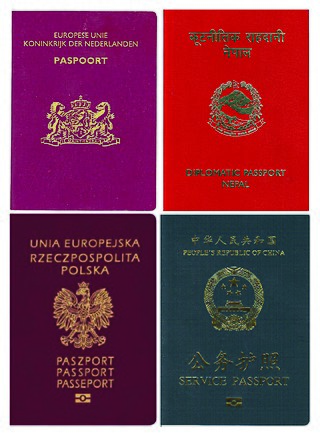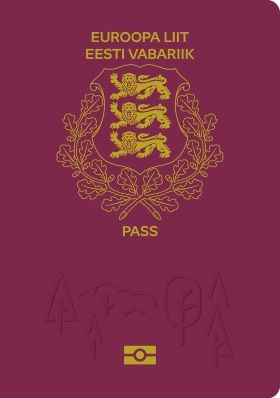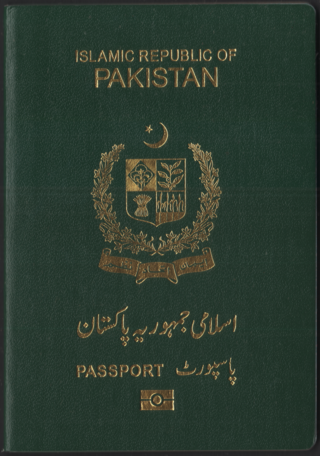
Visa requirements for Estonian non-citizens are administrative entry restrictions by the authorities of other states placed on holders of an Estonian alien's passport.

Visa requirements for Estonian non-citizens are administrative entry restrictions by the authorities of other states placed on holders of an Estonian alien's passport.

Non-citizens of Estonia may enter the following countries and territories without a visa: [1]
|

A passport is an official travel document issued by a government that contains a person's identity for international travel. A person with a passport can travel to and from foreign countries more easily and access consular assistance. A passport certifies the personal identity and nationality of its holder. It is typical for passports to contain the full name, photograph, place and date of birth, signature, and the issue and expiration dates of the passport. While passports are typically issued by national governments, certain subnational governments are authorised to issue passports to citizens residing within their borders.

A visum is a conditional authorization granted by a polity to a foreigner that allows them to enter, remain within, or leave its territory. Visas typically include limits on the duration of the foreigner's stay, areas within the country they may enter, the dates they may enter, the number of permitted visits, or if the individual can work in the country in question. Visas are associated with the request for permission to enter a territory and thus are, in most countries, distinct from actual formal permission for an alien to enter and remain in the country. In each instance, a visa is subject to entry permission by an immigration official at the time of actual entry and can be revoked at any time. Visa evidence most commonly takes the form of a sticker endorsed in the applicant's passport or other travel document but may also exist electronically. Some countries no longer issue physical visa evidence, instead recording details only in immigration databases.

A certificate of identity, sometimes called an alien's passport, is a travel document issued by a country to non-citizens residing within their borders who are stateless persons or otherwise unable to obtain a passport from their state of nationality. Some states also issue certificates of identity to their own citizens as a form of emergency passport or otherwise in lieu of a passport. The visa requirements of certificates of identity may be different from those of regular passports.

An Estonian passport is an international travel document issued to citizens of Estonia, and may also serve as proof of Estonian citizenship. Besides enabling the bearer to travel internationally and serving as indication of Estonian citizenship, the passport facilitates the process of securing assistance from Estonian consular officials abroad or other European Union member states in case an Estonian consular is absent, if needed. If an Estonian citizen wishes to receive an identity document, especially an Estonian passport, somewhere other than the foreign representation of the Republic of Estonia, then the bearer of the Estonian citizenship staying abroad could receive the travel documents in embassies of any EU country worldwide by paying 50 Euro. Many countries require passport validity of no less than 6 months and one or two blank pages.

The Estonian identity card is a mandatory identity document for citizens of Estonia. In addition to regular identification of a person, an ID-card can also be used for establishing one's identity in electronic environment and for giving one's digital signature. Within Europe as well as French overseas territories, Georgia and Tunisia the Estonian ID-card can be used by the citizens of Estonia as a travel document.

Estonian citizenship law details the conditions by which a person is a citizen of Estonia. The primary law currently governing these requirements is the Citizenship Act, which came into force on 1 April 1995.

An Estonian Alien's Passport is a travel document that may be issued to a person who is stateless or of undefined citizenship residing in Estonia by the Police and Border Guard Board of the Ministry of Internal Affairs. It can also be used as an identity document. Estonia has about 80,000 to 90,000 alien's passports.

Visa requirements for Pakistani citizens are the requirements by other countries to obtain a visa before entry on an ordinary Pakistani Passport.

Visa requirements for Estonian citizens are administrative entry restrictions by the authorities of other states placed on citizens of Estonia. As of January 2024, Estonian citizens had visa-free or visa on arrival access to 187 countries and territories, ranking the Estonian passport 8th in the world according to the Henley Passport Index.

Visitors to Georgia must obtain a visa from Georgian diplomatic missions unless they are citizens of one of the visa-exempt countries or one of the countries whose citizens may obtain an e-Visa.
The visa policy of the Philippines is governed by Commonwealth Act No. 613, also known as the Philippine Immigration Act, and by subsequent legislation amending it.

The visa policy of Jordan deals with the requirements which a foreign citizen wishing to enter Jordan must meet to be permitted to travel to, enter and remain in the country.

The visa policy of Ireland is set by the Government of Ireland and determines visa requirements for foreign citizens. If someone other than a European Union, European Economic Area, Common Travel Area or Swiss citizen seeks entry to Ireland, they must be a national of a visa-exempt country or have a valid Irish visa issued by one of the Irish diplomatic missions around the world.
Bangladesh requires all foreigners to obtain permission, specifically a visa, to enter its territory unless exempted. Visas are issued by Bangladesh diplomatic missions located throughout the world or, if applicable, on arrival in Bangladesh.

Under normal circumstances, visitors to Kuwait must obtain a visa unless they come from one of the visa exempt countries or countries eligible for visa on arrival/eVisa. All visitors must hold a passport valid for 6 months.

Haiti allows citizens from most countries to stay visa free for 3 months.

Visitors to Jamaica must obtain a visa from one of the Jamaican diplomatic missions or in certain cases from one of the United Kingdom diplomatic missions unless they are citizens of one of the visa-exempt countries or citizens who may obtain a visa on arrival.

Georgian nationality law is the organic law governing the acquisition, transmission and loss of Georgian citizenship.

Citizens of any country may obtain a visa on arrival. The visa is single entry and available for stays of between 15 days or 90 days. Citizens of Palestine are refused entry but can transit.

Visa requirements for Latvian non-citizens are administrative entry restrictions by the authorities of other states placed on Non-citizens of Latvia.